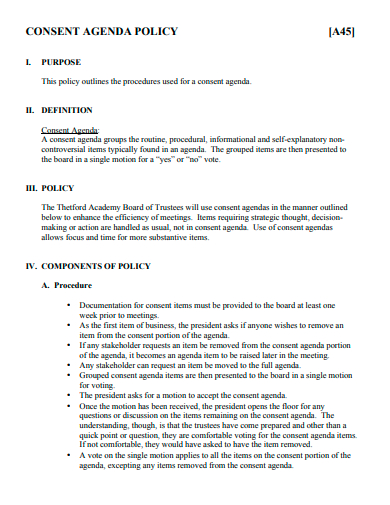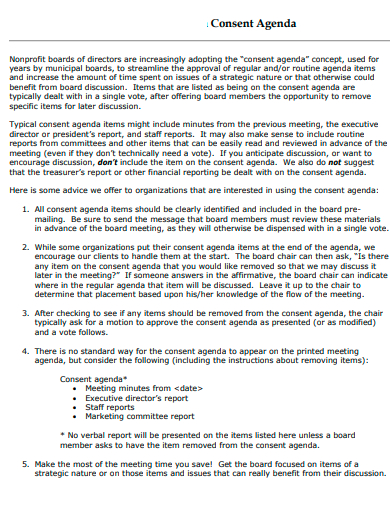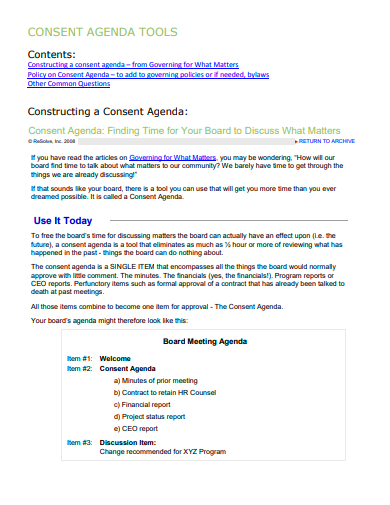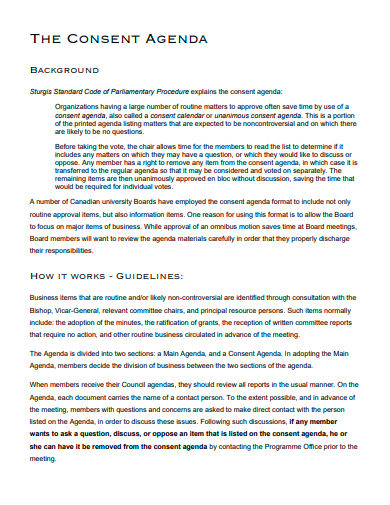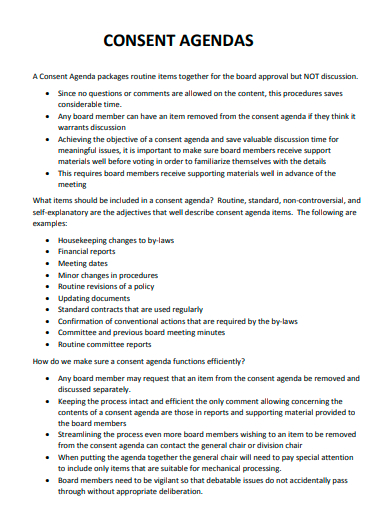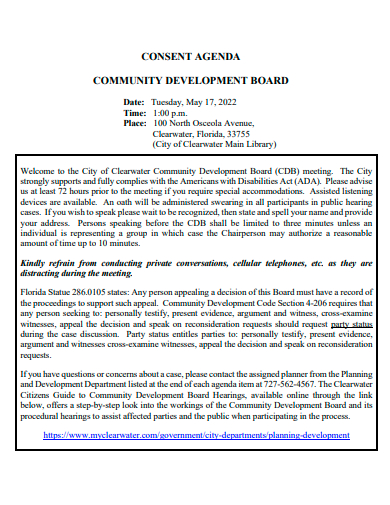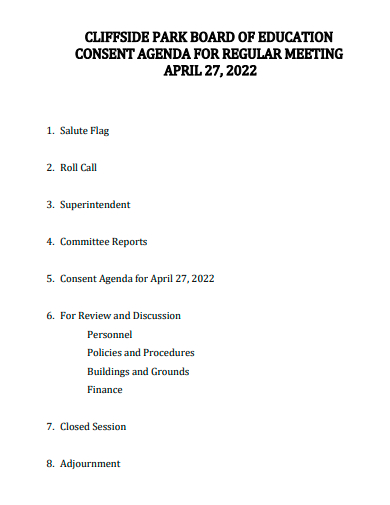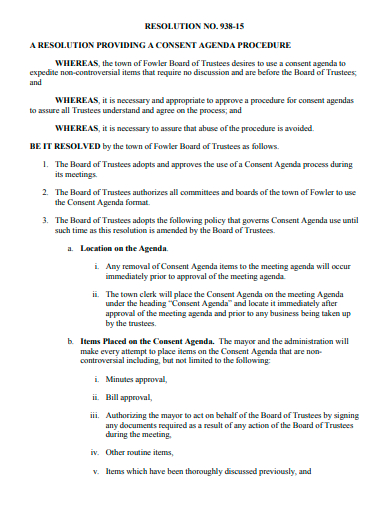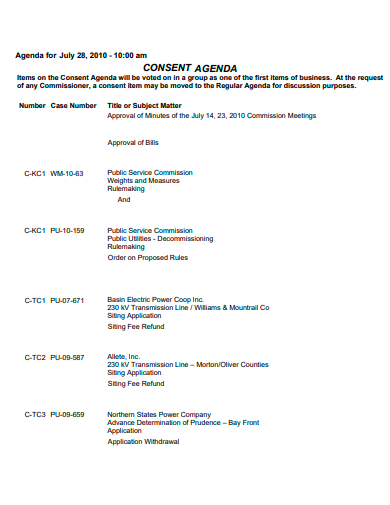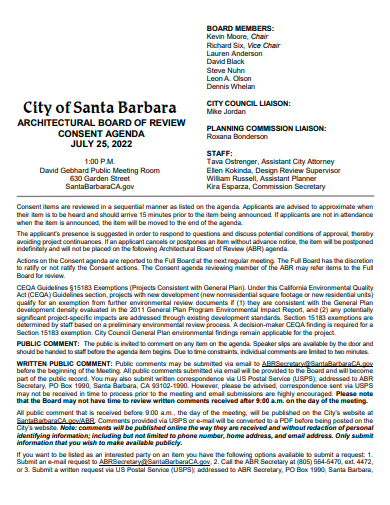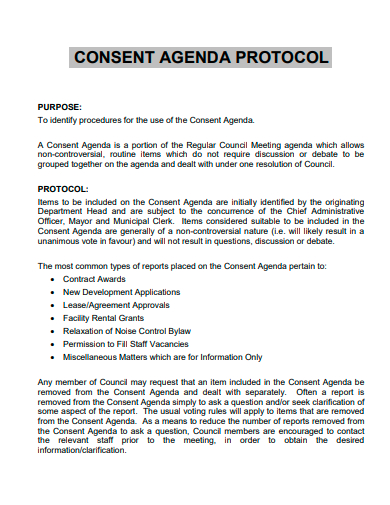As a city clerk, the clock is your number one adversary. You have a long list of responsibilities and work in an environment that is driven by deadlines, so you are constantly working to put together documents, content planning, agendas, meeting minutes, and other essential materials in time for the next meeting or to respond quickly to requests from citizens. In addition, you have a lot of work to do. Working with clerks in towns throughout the country of all sizes, we’ve heard repeatedly that one of their best-kept secrets for saving time is to adopt a consent agenda. This is something we’ve heard time and time again.
FREE 10+ Consent Agenda Samples
1. Consent Agenda Policy
2. Consent Agenda Template
3. Consent Agenda Tools
4. Consent Agenda Example
5. Standard Consent Agenda
6. Community Development Board Consent Agenda
7. Consent Agenda For Regular Meeting
8. Consent Agenda Procedure
9. Printable Consent Agenda
10. Architectural Board of Review Consent Agenda
11. Consent Agenda Protocol
What Is a Consent Agenda?
Consent agendas are used to promote approval of several safe, routine, or technical issues with a single motion, based on the idea that the materials sent to directors in the advancement of the weekly meeting adequately explain what is required for each item, and no discussion is required. When directors have reservations about passing a particular object without debate, they always have the power to request that the issue be withdrawn from the consent agenda and put on the regular schedule instead.
How To Make a Consent Agenda?
A group of topics that are put up for voting without any prior discussion is called a consent agenda. It differentiates between ordinary daily activities that do not require more discourse, on the one hand, and matters of substantial importance that require the attention of each director, on the other. You can read the steps that are below to get started on making it right away.
Step 1- Provide Documentation
The paperwork related to consent items must be supplied to the participants in the meeting in advance for them to be able to cast an informed vote on all of the things that have been grouped together. Before attending the meeting, team members are required to go over the documentation to ensure that they are aware of the matters that will be discussed as part of the consent group.
Step 2- Allocate Time for Inquiry
Before there can be a vote, participants in the meeting need to be allowed to ask any related questions and have those questions addressed. Each participant in the forum should have access to the questions and responses. After the motion has been made, but before to approval, simple concerns, clarifications, or brief amounts of conversation pertaining to the consent item may be brought up for discussion.
Step 3- Sample Objectives
Your team will be able to better prepare for the topics covered at the meeting if the objectives of the consent agenda are presented clearly and concisely. This provides them with further insights on the nature of the meeting and the potential topics that will be discussed throughout it.
Step 4- Provide Topics
It would be helpful if you could provide topics that are both in line with the aims of your consent agenda and that your guests have prior knowledge of. This helps to ensure that all of your attendees can participate in the discussions that take place during the meeting.
What exactly is going to be discussed?
The items of business that are going to be discussed during a meeting or session are listed on the agenda. A “calendar” is another name for this thing.
What is the agenda, and what is its purpose?
You and your coworkers will be able to better prepare for a meeting by using a meeting agenda and more efficiently navigating the topics that need to be discussed.
What is the main distinction between a regular agenda and a consent agenda?
The items that are typically discussed at a group’s routine meetings are compiled into a single agenda item called a consent agenda. By doing this, the things that have been grouped can be authorized in a single action as opposed to being approved through the filing of individual motions.
At the outset of a meeting, the president may propose a consent agenda to the attendees for approval. On the request of any one member, items may be taken off the consent agenda and discussed further. Items not removed from consideration may be approved by unanimous consent without further debate. It is critical to ensure that all directors know which topics should be included on the agenda and the process for transferring items to and from the consent agenda.
Related Posts
FREE 10+ Team Agenda Samples in PDF | DOC
FREE 10+ Client Meeting Agenda Samples in MS Word | Pages | Google Docs | PDF
FREE 10+ Strategy Meeting Agenda Samples in PDF
FREE 10+ Family Meeting Agenda Samples in PDF
FREE 10+ Day Agenda Samples in MS Word | Pages | Google Docs | PDF
FREE 10+ Program Agenda Samples in PDF
FREE 10+ Committee Meeting Agenda Samples in MS Word | Pages | Google Docs | PDF
FREE 6+ Wedding Agenda Samples in MS Word | PDF
FREE 10+ Retreat Agenda Templates in PDF | MS Word
FREE 18+ Safety Agenda Samples & Templates in MS Word | PDF
FREE 10+ Board Agenda Samples & Templates in PDF | MS Word
FREE 10+ Interview Agenda Samples and Templates in PDF | MS Word
FREE 7+ Travel Agenda Samples and Templates in PDF
FREE 10+ Project Agenda Samples and Templates in PDF | MS Word
FREE 12+ Sales Agenda Templates in PDF | MS Word

